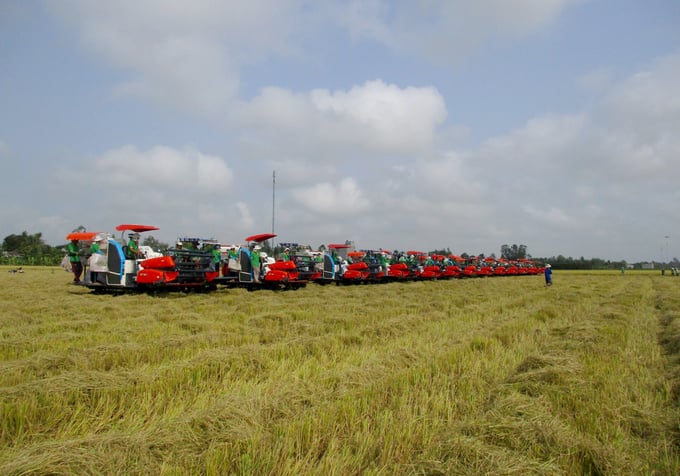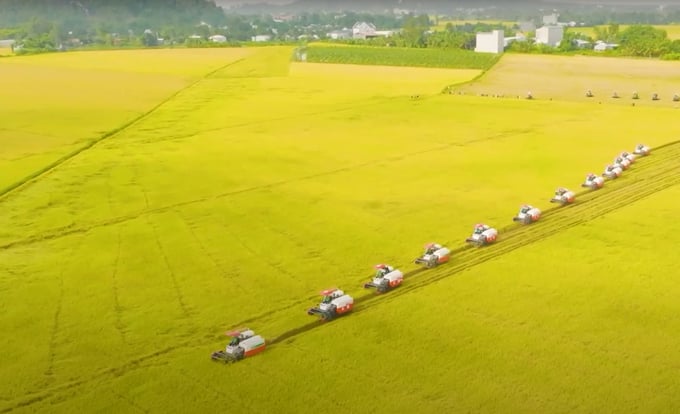May 21, 2025 | 03:07 GMT +7
May 21, 2025 | 03:07 GMT +7
Hotline: 0913.378.918
May 21, 2025 | 03:07 GMT +7
Hotline: 0913.378.918

Loc Troi Group is the first enterprise to achieve 100 SRP points in rice production. Photo: Thanh Son.
The Sustainable Rice Platform (SRP) is a global multi-partner alliance established in December 2011 by the United Nations Environment Program (UNEP) and the International Rice Research Institute (IRRI) to encourage sustainable development and enhance the efficiency of resource use in the rice value chain in particular and agricultural production in general.
Mr. Nguyen Duy Thuan, General Director of Loc Troi Group, said realizing the similarity between SRP's goals and the Group's mission is to work towards sustainable agricultural development. In 2017 Loc Troi officially joined the SRP forum.
Accordingly, Loc Troi pioneered testing the set of SRP criteria in a sustainable rice production model, practicing 41 criteria in 8 important topic groups to ensure the cultivation process, field management, and water saving, ensure occupational health and safety, and promote gender equality.
After many years of continuous improvement of the model, in the winter-spring rice crop 2019-2020, Loc Troi Group achieved 100 SRP points on a cultivation area of about 100 hectares of 13 advanced farmers in An Giang and Dong Thap. Control Union, an independent testing agency authorized by SRP, confirms this result. Thus, Loc Troi has become the first enterprise in the world to achieve perfect results in implementing SRP standards. Not stopping there, Loc Troi is continuing to maintain the result of 100 SRP points for 3 consecutive years (2020 - 2022).
It is worth noting that besides reducing farming costs and increasing rice yields, the SRP model implemented by Loc Troi has helped reduce greenhouse gas emissions through climate change-adapted farming methods. First of all, is the technical solution of alternate wet-dry irrigation. This technique helps to reduce methane emissions by allowing the fields to be vented when water is withdrawn during the growing period of the rice plant.
Reducing fertilizer use and not burning rice straw after harvest helps reduce greenhouse gas emissions from excess organic matter in the field. Straw can be used as fertilizer or silage for calves, helping increase organic circulation in the soil and reduce greenhouse gas emissions in the next crop.
From organizing the 100-point SRP model, Loc Troi recognized the initial results that the SRP practice significantly reduced methane emissions compared to conventional farming processes. Therefore, the Group is working with IRRI to pilot a greenhouse gas inventory mechanism under the SRP process and discuss with the World Bank agricultural carbon credit programs. Loc Troi is also willing to participate in projects of the An Giang Provincial People's Committee and the Ministry of Agriculture and Rural Development on low-carbon rice cultivation.

Applying mechanization in a field of Loc Troi. Photo: Thanh Son.
To prepare for the expansion phase of the SRP process in the raw material area, Loc Troi has been working with IRRI to train 100 of the Group's employees to become SRP instructors (SRP Authorized Trainer). This is the critical Group of personnel to roll out the SRP criteria to more cooperatives and is authorized to validate the second-level SRP scores (assessment from direct partners).
In the past, farmers had the practice of burning rice straw after harvest, which pollutes the air, removes a significant amount of organic matter from the field, and increases greenhouse gas emissions.
Loc Troi Agricultural Research Institute (a member of Loc Troi Group) has been carrying out many studies to improve the efficiency of post-harvest rice straw treatment. These works focus on utilizing the abundant straw in the Mekong Delta to make animal feed, grow mushrooms, and make organic nutrients.
"Together with farmers for sustainable development" is a program that Loc Troi Group has persistently and continuously implemented since 2011 to build a livable countryside gradually.
With the determination to fulfill the above commitment, Loc Troi has set a goal to reduce 1 million liters of chemicals poured into Vietnamese fields annually through synchronizing mechanization and applying technical advances.
The development of production according to SRP standards is helping Loc Troi significantly reduce the number of chemicals used. Specifically, in terms of fertilizers, a large amount of chemical fertilizers are being replaced by organic fertilizers. After harvesting rice, the source of rice straw in the field is sprayed with Trichoderma probiotics, then plowed into the soil with a plow, which will gradually decompose into organic fertilizers that provide nutrients for the soil and the next rice crop.

Loc Troi reduces the amount of pesticides by using drones to spray. Photo: Thanh Son.
Regarding the use of pesticides, due to the planning of the area and the crop management, the situation of pests and diseases in the fields produced according to SRP standards is well understood and regularly monitored by technical staff. This helps to reduce the amount of spray. Besides, using drones to spray rice fields has helped Loc Troi significantly reduce the amount of pesticides compared to manual spraying. By synchronizing mechanization and production according to SRP standards, farmers have reduced the amount of chemical fertilizers by 30% and pesticides by 20-30%.
An outstanding advantage of SRP is the process towards a balance between three factors organic, biological, and chemical, thereby helping the Group reduce 1 million liters of chemicals poured into the fields. Loc Troi has committed to the Plant Protection Department that by 2030, biological and organic products will account for 40% of the Group's pesticide product range.
From 2023 to 2025, all activities in Loc Troi ecosystem will continue to be invested and developed, improving the capacity to organize large-scale, synchronous, and continuous agricultural production through contracts. The cooperative has an area of at least 1,000 ha. The Group applies agricultural knowledge to crop management, supplying agricultural materials according to chemical, biological, and organic balance solutions towards reducing chemicals in agriculture. The Group continues to deploy synchronous mechanization and the use of drones in all stages of farming to increase efficiency and reduce costs, aiming to produce at stable prices and ensure long-term economic benefits for farmers joining the association. Thereby creating rice and rice products that meet quality standards, meeting increasingly strict criteria of the world market.
Loc Troi Group continues to promote sustainable development projects, programs, and initiatives at the parent company and member units, to make practical contributions to Vietnam's agricultural industry in adapting to climate change and reducing greenhouse gas emissions from rice farming.
Translated by Ha Phuc

(VAN) Japan's grant aid project contributes to capacity building, promoting organic agricultural production, and fostering sustainable community development in Dong Thap province.

(VAN) For years, the CRISPR-Cas9 genome technology has been reshaping genetic engineering, a precision tool to transform everything from agriculture to medicine.

(VAN) Vietnam aims to become a 'leader' in the region in the capacity and managing effectively soil health and crop nutrition.
![Reducing emissions from rice fields: [Part 1] Farming clean rice together](https://t.ex-cdn.com/nongnghiepmoitruong.vn/608w/files/news/2025/05/05/z6509661417740_a647202949c539012a959e841c03e1d3-nongnghiep-143611.jpg)
(VAN) Growing clean rice helps reduce environmental pollution while increasing income, allowing farmers to feel secure in production and remain committed to their fields for the long term.
/2025/05/19/5136-1-144800_230.jpg)
(VAN) The Nghe An Provincial People's Committee has just approved the list of beneficiaries eligible for revenue from the Emission Reductions Payment Agreement (ERPA) in the North Central region for the year 2025.

(VAN) 14 out of 35 domesticated elephants in Dak Lak province have had their living conditions improved, with 11 of them currently participating in the non-riding elephant tourism model.

(VAN) Muong Nhe Nature Reserve hopes that being upgraded to a national park will lay the foundation for forest protection efforts to be carried out in a systematic, modern, and sustainable manner.